| Srl | Item |
| 1 |
ID:
125267
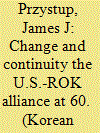

|
|
|
|
|
| Publication |
2013.
|
| Summary/Abstract |
It is important to recognize how successful the U.S.-ROK Alliance has been for the past sixty years in deterring North Korea from attempting to unify the Korean Peninsula by force. This paper addresses Korea's unique status and examines its strong presence in meeting commitments to the international community. The future will require alliance-based cooperation with international partners to address challenges posed by the proliferation of WMD, which is one among many. In the end, however, the U.S.-ROK Alliance will only grow stronger, enhancing stability and security on the Peninsula.
|
|
|
|
|
|
|
|
|
|
|
|
|
|
|
|
| 2 |
ID:
071465
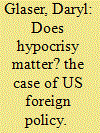

|
|
|
|
|
| Publication |
2006.
|
| Summary/Abstract |
US foreign policy is hypocritical in various ways, as this article demonstrates in the course of an extensive empirical review. The question is whether such hypocrisy provides grounds for opposing US interventions abroad, in particular those which might yield locally desirable outcomes at an acceptable human cost. This article examines the question from the standpoint of a non-pacifist liberal universalism and concludes (on consequentialist grounds) that the hypocritical character of US foreign policy cannot constitute sufficient grounds for rejecting all US interventions. Nevertheless, the hypocrisy of the US remains noteworthy and deserving of criticism even in such cases because of the wider damage hypocritical behaviour can do. Moreover, US foreign policy hypocrisy sometimes sets in motion reactions that confound the benign purposes of particular interventions and so undermine the case for them. Such an effect is at work in the case of recent US intervention in the Middle East.
|
|
|
|
|
|
|
|
|
|
|
|
|
|
|
|
| 3 |
ID:
145919
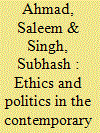

|
|
|
|
|
| Summary/Abstract |
Almost thirteen years after the invasion of Iraq, it teaches several ethical lessons about war as an instrument of the US foreign policy. First, and foremost, the Iraq war reminds us of the folly and immorality of pre-emptive war. The Bush administration attempted to exercise its “entitlement to meddle…to demonstrate its capacity to impose its will on its designated adversaries” by invading Iraq. President Bush’s efforts to exercise his “entitlement to meddle” backfired when it gave birth to an intractable insurgency against the American occupation forces and an ongoing civil war in Iraq. Second, the Iraq war offers an object lesson on the limits of imperial might.
|
|
|
|
|
|
|
|
|
|
|
|
|
|
|
|
| 4 |
ID:
133056
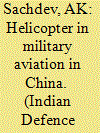

|
|
|
|
|
| Publication |
2014.
|
| Summary/Abstract |
China has the world's second largest defence budget next only to the US and with the future looking upbeat tor China's economy and for its military spending, defense manufacturers and contractors the world over are eyeing the Chinese military helicopter market. Meanwhile, the types being produced as "indigenous" lag behind the leading edge of helicopter technology as extant in the Western world. It the US relents over the arms embargo, there could be a signilicant change in the tenor and texture of China's military helicopter fleet, with implications for a possible future Sino-Indian armed conflict.
|
|
|
|
|
|
|
|
|
|
|
|
|
|
|
|
| 5 |
ID:
125254
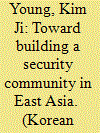

|
|
|
|
|
| Publication |
2013.
|
| Summary/Abstract |
Despite the high-level economic interdependence and cultural exchange among major regional actors, the current security environment of Northeast Asia is rather volatile. The tension surrounding North Korean military aggression, the Taiwan Strait, and the East/South China Sea indicates the necessity of a security mechanism that restrains the aggressive actions of the regional actors involved. One viable option is to build a security community within which member states share an expectation of settling their differences through peaceful means. Based on an examination of the current state of security cooperation among South Korea, China, and Japan, this paper argues that the main impediment to a sustainable regional security community has been identity conflict caused by the history disputes among the three countries, not the lack of institutional settings or U.S. support. Shared identity and the concomitant mutual trust are prerequisites for genuine security cooperation. Therefore, this paper suggests the reconciliation process between South Korea and Japan as the initial step toward building an East Asian security community, paying attention to its implications for South Korea-China- Japan reconciliation.
|
|
|
|
|
|
|
|
|
|
|
|
|
|
|
|
| 6 |
ID:
177792
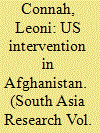

|
|
|
|
|
| Summary/Abstract |
This article argues that the USA and its Western allies have misused ‘Just War’ narratives to legitimise an external intervention in Afghanistan and their use of force during the War on Terror. It explores the extent to which such external interventions, military strategies, narratives and justifications by the USA may have contributed to state failure in Afghanistan. As the legitimacy of earlier external interventions is called into question, while the road ahead for Afghanistan remains precarious, thinking about a new paradigm of post-war reconstruction becomes important for the country and its people in years to come.
|
|
|
|
|
|
|
|
|
|
|
|
|
|
|
|
| 7 |
ID:
176534
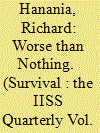

|
|
|
|
|
| Summary/Abstract |
Rather than seek to stop human-rights abuses through regime change, the United States should choose engagement and seek to end civil wars.
|
|
|
|
|
|
|
|
|
|
|
|
|
|
|
|